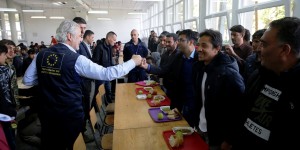The European Union and its Member States pledged today more than €3 billion to assist the Syrian people inside Syria as well as refugees and the communities hosting them in the neighbouring countries for the year 2016.
The pledge triples the EU support offered at the last donor conference in Kuwait on 31 March 2015, and comes on top of the €5 billion that the EU has already committed in response to the worst humanitarian crisis since World War II.
The announcement was made at the ‘Supporting Syria and the Region’ conference hosted by the United Kingdom, Germany, Norway, Kuwait and the United Nations by the President of the European Council Donald Tusk and High Representative/Vice-President Federica Mogherini.
Tusk and Mogherini represented the EU alongside Johannes Hahn, Commissioner for European Neighbourhood Policy and Enlargement and Christos Stylianides, Commissioner for Humanitarian Aid and Crisis Management. The London-based conference drew leaders from of over 70 delegations.
European Council President Tusk conveyed a message of hope: “With this pledge we hope to offer millions of people better lives. Refugees have had little choice but to flee their country. Many of them have lost everything. And now after so many years of conflict, people have lost hope. We have a moral duty to bring their hope back.”
HRVP Mogherini recalled that only a political solution would put an end to the immense suffering experienced by the Syrian people and reiterated the EU’s full support to the efforts undertaken by UN Special Envoy Staffan de Mistura to ensure constructive peace talks.
She added: “As the European Union, we share with the entire international community the responsibility to save Syria, for the sake of its citizens and the whole region. That’s why we bring proposals to further step up our existing engagement of the last five years, when the EU has already been the leading donor on the Syria crisis. While we provide humanitarian and development aid, and propose economic and financial support in different forms also for Jordan and Lebanon, we keep working for a political transition in Syria that can put an end to the war. The intra-Syrian talks in Geneva have opened a window of opportunity. This window will not be open forever, and it is crucial that all the parties engage constructively in a dialogue that has to bring concrete results on the ground. The EU and its Member States will continue to provide life-saving assistance, but also to push all parties to ensure access to those in need across Syria, to work on ceasefires and to protect civilians. The humanitarian work and the diplomatic efforts have to go hand in hand: they can reinforce each other, or weaken each other. The EU is committed to making both deliver.”
Over the past five years, the war has claimed more than 250,000 lives, most of them civilians, while over 18 million people are in need of assistance, including 13.5 million inside Syria. The war has led to major displacements inside the country (6.5 million internally-displaced) and beyond. With over 4.6 million people having fled primarily to Lebanon, Jordan and Turkey, the war has had a deep impact on Syria’s neighbours.
The continued hospitality and generosity of Syria’s neighbours and especially the communities hosting the refugees is widely appreciated by the international community. At the London conference, the EU announced its intention to significantly increase its support in particular to Lebanon and Jordan, the two countries with the biggest number of refugees in terms of proportion of refugees to the host population. The EU is ready to start negotiating ‘EU Compacts’ with both countries, to strengthen its political, economic, trade and social ties in addition to improving the living conditions of refugees and affected host communities.


